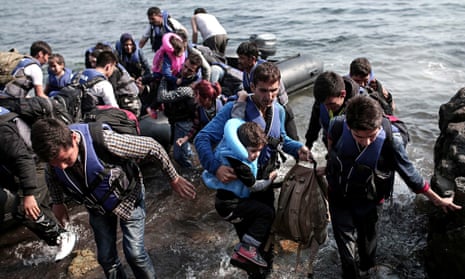Britain cannot open its borders to everyone fleeing war anywhere in the world, but this does not excuse the government’s shameful determination to keep our borders closed to as many refugees as possible. Our international treaty obligations, as well as the promptings of our collective conscience, entail a duty to offer meaningful sanctuary when a humanitarian catastrophe unfolds before our eyes.
The prime minister surely understands this. He is personally capable of compassion, but his political instincts have been conditioned by defensive parochialism: fear of alienating those parts of the press and the electorate where hostility to foreigners is visceral. His reluctance to engage with pan-European efforts to accommodate refugees stems from a refusal to articulate any circumstances in which national questions should be answered at continental level.
This makes his argument for focusing on the causes of mass displacement, above all the war in Syria, sound disingenuous – hard-heartedness camouflaged as strategy. But the underlying point is valid. What appears on our TV screens as a sudden emergency is really the culmination of years of failure to confront Syria’s bloody collapse. This, sadly, is symptomatic of a more profound myopia in European security policy. Not only Britain is responsible for European paralysis.
There is a wide arc of conflict-ridden, repressive and failed states running from the Middle East, round the Horn of Africa and along the southern Mediterranean coast. There are tens of millions of people living in that region who might reasonably decide that the only future for them and their families lies in Europe. There is little sign that European leaders have even begun to engage with each other or with their electorates on the questions this raises for the security, legitimacy and stability of the European Union.
Although it is essential in discussion of the current crisis to remember the legal distinction between refugees – seeking sanctuary from imminent danger – and the wider category of people who migrate in search of a better future for themselves and their families, it is also important to acknowledge that, in places where economic activity, law and order are breaking down, the line between the two categories is technically and ethically hard to draw.
The complexity of the challenge almost invites paralysis. There is no obvious formula for intervention in broken states. There is no wholly satisfactory precedent for the deployment of western power in support of democracy. The optimism of the Arab spring is spent. Colonel Gaddafi was a tyrant, yet Libya has unravelled violently in the aftermath of his removal. The refusal to intervene against Bashar al-Assad gave the Syrian president permission to continue murdering his people, yet it is not obvious that the limited air strikes proposed to deter him would have saved the situation. Now, when military intervention in Syria is debated, the target is Islamic State – a force on the other side of the civil war.
While no perfect solutions present themselves, inertia punctuated with panic is the worst response. Since Syria’s plight is the most immediate moral and strategic problem, that is where Europe must begin the search for solutions. The increase in refugee numbers heading for the EU describes a collapse of hope among millions of Syrians, many displaced in neighbouring countries, that their home will be safe again in their lifetime. To begin restoring that hope will inevitably mean international intervention of some kind. The establishment of credible safe havens and the implementation of a no-fly zone must be on the table for serious consideration. Russia, as the state with most influence over Assad, must somehow be convinced to rein him in. EU powers must be prepared to spend more of their efforts and resources fostering the conditions for ceasefire.
None of this is straightforward, nor will its impact be felt immediately. But the long years of European equivocation and denial have proved calamitous. For decades the focus has been procedural – the way decisions are made in an expanding union; the delineation of competences between institutions – and, more recently, financial: the operation of the single currency. The need for Europe to develop a coherent account of its place in the wider world has often been discussed as the goal once internal matters are settled, but that moment keeps being deferred. Yet the rest of the world is not waiting. Its fearful dispossessed are rattling Europe’s gates.
